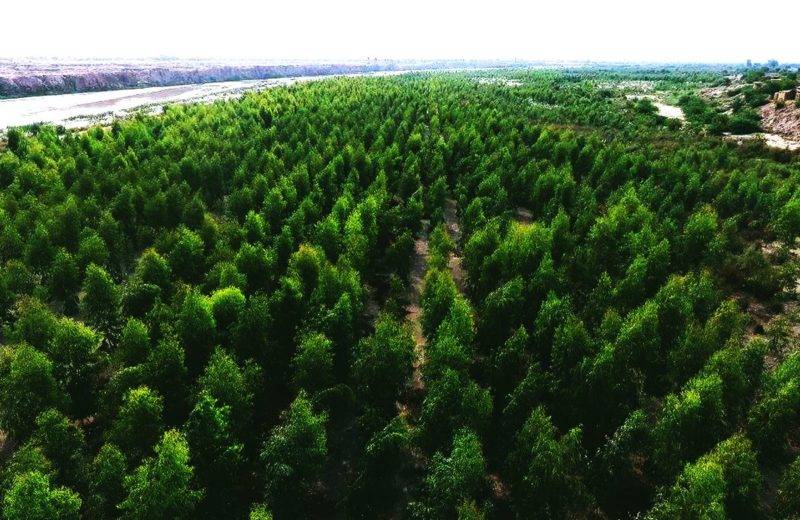
Pakistan Tehreek-e-Insaf (PTI) government's flagship project, Ten Billion Tree Tsunami (TBTT), has been facing wide-ranging allegations of corruption in Punjab as reports of bogus billing, fake plantation, poor quality earthwork, and unauthorised payments have emerged.
According to a news report of journalist Ansar Abbasi published in The News, the authorities of Punjab are trying to ‘cover-up’ the corruption allegations by claiming that the the afforestation and reforestation campaign under the TBTT project has been damaged by the ongoing locust attacks.
Following complaints of massive corruption in the project, Punjab’s Forestry Department constituted an official committee on June 10 to probe “the large-scale damage to afforestation carried out under the Ten Billion Tree Tsunami programme by the locust attack”. The committee was assigned to complete its task within 15 days but for unknown reasons it was unable to even start work.
However, on June 30, the Forest Department issued another order for the dissolution of the earlier committee and the setting up of a new probe team. The report quoted the official sources as saying: “The earlier committee was far more competent, but it was not allowed to start the probe. The second probe committee has not yet started work too, although it was also given 15 days to complete its task.
The sources also alleged that Forest Department officials are involved in the scam and are therefore ‘sabotaging’ a fair probe into the TBTT project. The report further claimed that serious complaints have been received about the project’s implementation in Bhakkar and Chakwal districts and DG Khan division involving huge levels of corruption.
“Sources in the Forest Department confirm that these complaints are not only true in the case of the regions mentioned earlier but the Ten Billion Tree Tsunami project has been seriously compromised by corruption and poor implementation in the entire province. In the three areas mentioned, it is said that against a plantation target of 11,500 acres for the last fiscal year, hardly 20-25 percent of that area was planted and that too was done without ensuring quality of plantation. To cover up the corruption, plantation on a smaller area with poor quality work was later conveniently shown as completely damaged by a locust attack,” the report noted.
According to a news report of journalist Ansar Abbasi published in The News, the authorities of Punjab are trying to ‘cover-up’ the corruption allegations by claiming that the the afforestation and reforestation campaign under the TBTT project has been damaged by the ongoing locust attacks.
Following complaints of massive corruption in the project, Punjab’s Forestry Department constituted an official committee on June 10 to probe “the large-scale damage to afforestation carried out under the Ten Billion Tree Tsunami programme by the locust attack”. The committee was assigned to complete its task within 15 days but for unknown reasons it was unable to even start work.
However, on June 30, the Forest Department issued another order for the dissolution of the earlier committee and the setting up of a new probe team. The report quoted the official sources as saying: “The earlier committee was far more competent, but it was not allowed to start the probe. The second probe committee has not yet started work too, although it was also given 15 days to complete its task.
The sources also alleged that Forest Department officials are involved in the scam and are therefore ‘sabotaging’ a fair probe into the TBTT project. The report further claimed that serious complaints have been received about the project’s implementation in Bhakkar and Chakwal districts and DG Khan division involving huge levels of corruption.
“Sources in the Forest Department confirm that these complaints are not only true in the case of the regions mentioned earlier but the Ten Billion Tree Tsunami project has been seriously compromised by corruption and poor implementation in the entire province. In the three areas mentioned, it is said that against a plantation target of 11,500 acres for the last fiscal year, hardly 20-25 percent of that area was planted and that too was done without ensuring quality of plantation. To cover up the corruption, plantation on a smaller area with poor quality work was later conveniently shown as completely damaged by a locust attack,” the report noted.
